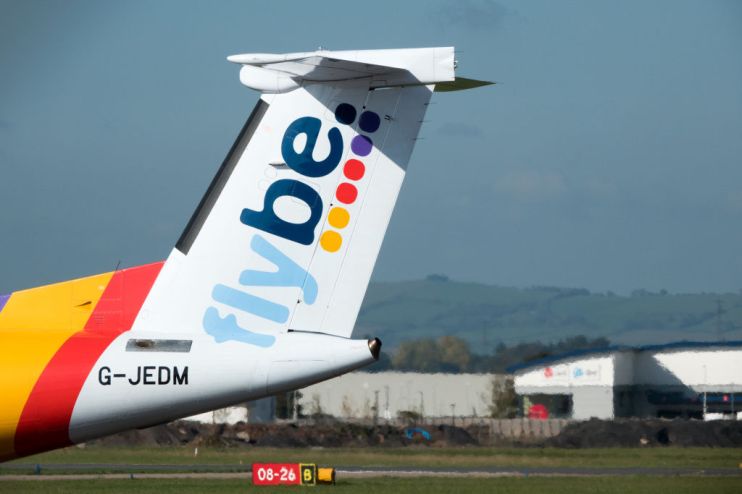Flybe infected by aviation sector’s malaise

As ministerial tweets go, the mid-January proclamation by the business and transport secretaries that Flybe’s future had been salvaged will surely endure as among the most ill-judged of Boris Johnson’s government.
Barely 54 days later, Flybe has become just another corporate carcass, joining Monarch and Thomas Cook among the airlines which failed to cope with brutal industry conditions.
So much for the denials of Mark
Anderson, the boss of Flybe parent Connect Airways, that his company was seeking a state bailout.
With the advent of coronavirus, the £3.5m in tax deferrals it secured from HM Revenue & Customs barely touched the sides. His witness statement, filed in court on Tuesday night after last-ditch rescue talks had failed, details a company that was in perpetual survival mode even after its deep-pocketed shareholders took it over.
It would be ludicrous to blame the government or the airline’s management for the impact of the Covid-19 outbreak on future bookings.
Serious questions do need to be asked, though, about the apparent lack of effort on Flybe’s part to secure emergency financing from private lenders before the infection emerged, and the apparent lack of co-ordination between Whitehall departments — particularly since last month’s cabinet reshuffle.
Anderson’s court filing implies that the government was willing to provide financial support but took fright at the legal threats of Ryanair and of British
Airways’ parent International Airlines Group. That’s not a good look, when thousands of jobs are at stake.
For Flybe staff, it will be a painful coincidence that its collapse came in the same week that British Steel — which has enjoyed nearly a year of financial support from taxpayers — took a big stride towards long-term survival. However much Johnson might seek to deny it, winners are being picked by his administration.
The decision to reject Flybe’s loan application may well have made sense on commercial grounds, but for a government which has promised to “level up” the UK’s regions, its collapse leaves them staring at a gaping policy inconsistency — and one perfect for pointing out on a medium like Twitter.
Watchdog’s Goldman audit
Here’s an unexpected, and interesting, intervention in the frenzied debate about auditor independence.
It comes from the Prudential Regulation Authority (PRA), which has decided — in the wake of balance sheet bombshells at Metro Bank and Citi — to take big lenders to task over the quality of their regulatory reporting.
Last week, it emerged the PRA had appointed PwC to oversee a “skilled person’s report” on the filing of data to regulators by Goldman Sachs
International.
The decision has not gone unnoticed by PwC’s peers, who point out that the accountancy firm is Goldman’s global auditor.
Sources say the PRA has satisfied itself that because Goldman’s London-based operations are now audited by Mazars, there is no conflict in PwC conducting the Section 166 review.
Indeed, under the Financial Reporting Council’s recently revised ethical standard, S166 investigations are specifically excluded from the list of prohibited non-audit services that can be undertaken by a company’s auditor.
Nevertheless, the fact that the banking regulator has had to turn to Goldman’s own auditor to handle the probe might be seized upon by critics of the profession as fresh evidence of a lack of choice — as if any more was needed.
Quilter bidders try, try again
Could it be a case of third time lucky in the quest to buy Quilter, one of Britain’s biggest wealth managers?
Four years ago, Cinven and Warburg Pincus teamed up to make an offer for the company, then part of Old Mutual, the FTSE-100 Anglo-South African financial services group.
That approach failed as Old Mutual prioritised its own orderly break-up through the public markets.
It didn’t deter the buyout duo, who I understand tabled an indicative offer of about 190p-a-share for Quilter late last year.
Quilter, whose logo now features prominently at England’s home rugby union internationals, rejected the proposal, although not, I understand, without a level of boardroom disharmony.
According to my sources, Paul Feeney, the company’s chief executive, was in favour of engaging at that level, but chairman Glyn Jones was less convinced.
Significantly, the approach — and its value — was never formally disclosed to investors. After the coronavirus-inspired market correction of the last fortnight, shareholders would be forgiven for feeling aggrieved about that. At yesterday’s close, Quilter shares sat at the comparatively lowly level of 146.80p.
The business remains a work in progress, with a new IT platform and internal restructuring only recently started to bear fruit.
The four years between Cinven and Warburg Pincus’s approaches have already demonstrated the buyout barons’ patience. It would be surprising if they didn’t return later this year with another attempt to reach Quilter’s try line.
Mark Kleinman is City editor at Sky News. @MarkKleinmanSky
